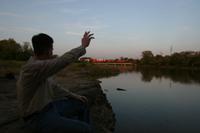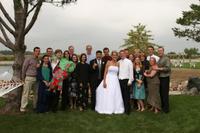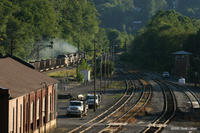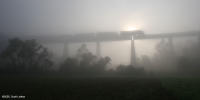We've all heard how one man's trash can be another man's treasure. Tangentially, then, one man's purgatory can be another's paradise. The tiny, remote town of Lixin (Leesheen), Heilongjiang, China, was both for me last night.
Our group of rail photographers (well, ten of the eleven -- one opted for the hotel back in Huanan) spent the night in the railway workers' house in Lixin along the Huanan narrow guage coal railway. Lixin is the beginning of the steep climb for eastbound loaded trains, so it contains a modest servicing facility for the locomotives.
Modest would be a bit too gentle a way of describing the lodging accommodations, at least by western standards. There are absolutely no bathroom facilities, not even an outhouse. There is electricity, but it is quite sparse and the circuit of low capacity. A welder at the station caused the single-bulb pole light in front of the water tower to go dim, several hundred feet away. Our beds are best described as two wide, wooden tables covered in linoleum which may or may not have been cleaned with soap and water since they were built. We slept five to a bed, with blankets that may or may not have been washed since they were sewn. The one ingenious quality of the beds is that they are heated from beneath by the cooking stove (wood fired, of course) in the next room, and thus stay quite toasty, even on cold nights (of which there are plenty in far northeastern China).
Lixin can also be a very dangerous place at night, as three of us found out the hard way. I received one of the greatest shocks of my life when I stepped between two dark rails, expecting to find solid crossties, and instead found only open space. Five very swift feet later, my feet were on the ground in the bottom of the locomotive inspection pit. I would have escaped relatively unscathed had not my left cheek soundly struck the opposite wall on my way down. As a result, I now look like a chipmunk on the one side, it hurts to chew and bite down hard and there's a burst blood vessel in the corner of my left eye. It was 24 hours before I saw myself in a mirror, and even after all that time for the swelling to go down, I was horrified at what I saw. It could have been much worse, though, and as it wasn't I am quite thankful. I am also very thankful for all the care and concern showed to me by the other members of our group and the Chinese in Lixin. True to form, though, once I realized I was still alive and had stumbled out of the pit, the first thing I checked for damage was my camera (it's okay).
Not long after that, and before word had spread of my misstep, Volker, one of our Germans, did exactly the same thing, minus the solid thump to the cheek. He emerged unscathed. Not long afterwards, Tom (one of the Brits) took a nasty tumble over two rails hanging well above ground level and bruised his chest a bit. He would have been the center of attention had I not managed to earlier top his injury. Typically American of me, I suppose.
After all this, I imagine that Lixin is sounding quite a bit like purgatory, mine in particular. That is, of course, not entirely the case. Lixin, despite its lack of creature comforts and plethora of safety hazards, holds a special calling. I have not even been gone from there 12 hours, and already it is calling me back. It is at the base of the mountain where the valley opens up broadly to the east, more than a two hour hike from the nearest (dirt) road. It has but a smattering of permanant residents, many of whom work for the railway. Even with a swollen left jaw, there is something unforgetable about waking in the middle of the night to the whistle hoot of an arriving steam train, drifting back to sleep, then waking again to the rythmic exhaust as two locomotives push and pull an eight-car train out of the station and up the narrow valley to the summit, their bark echoing off the hills for the duration of their upgrade journey.
After falling asleep between 9 and 10, I awoke at 3 in the morning with the pain much reduced and feeling relatively awake. After relieving myself in the bushes outside and hearing the distant exhaust of an approaching train, I decided there was no sense in going back to sleep. I walked back down to the engine facility (carefully shining my flashlight and giving a very wide berth to the pit this time) and watched the action. One locomotive was already simmering away by the water tahk, its escaping steam a soft whisper in the otherwise silent night. Minutes later, a train of empty hoppers drifted down off the hill. Its locomotive detached, turned on the wye, and came to a stop by the water tower to top its tank and clean its firebox. The night was cold and the steam heavy, and I enjoyed an hour of photographing the crews preparing the ir locomotives and train for departure. When all was ready, the first engine coupled up to the loaded hoppers waiting on the mainline and pulled ahead. The second then coupled on behind. It was barely 4:30 in the morning, but in far northeastern China, sunrise comes early, even in late September (the whole country is on one time zone, centered at Beijing, and does not observe daylight savings time). Blue dawn was breaking over the hills when the locomotives whistled off and went steaming up the hill and into the day.
ir locomotives and train for departure. When all was ready, the first engine coupled up to the loaded hoppers waiting on the mainline and pulled ahead. The second then coupled on behind. It was barely 4:30 in the morning, but in far northeastern China, sunrise comes early, even in late September (the whole country is on one time zone, centered at Beijing, and does not observe daylight savings time). Blue dawn was breaking over the hills when the locomotives whistled off and went steaming up the hill and into the day.
It rained later in the morning, but that hardly mattered. The railway workers were friendly and gave us the run of their home. Tom and I passed an enjoyable half hour in the water tower building with an old Chinese man watching a black and white television with fuzzy reception. Four flies crawled on the screen as two prim and perfect peppy women introduced an educational program on weights and measurements (at least that's what we deduced by watching). The old man sat completely enthused as an energetic young man in the fuzzy monochrome screen bounced from mechnical scales to electronic balances, very loudly demonstrating the use and accuracy of each.
We left on foot in the afternoon, and had the pleasure of photographing two more trains, a loaded one and an empty, on the hike back to our bus, waiting on the dirt road in Touyaozi. A two-hour drive north brought us to Hegang, a bustling, glistening coal-mining town that could rival Vegas for its unabashed usage of the electric light. I write this from the internet cafe across the street from our hotel, on a computer between two smoking Chinese men, one whose barefeet occupy the seat next to mine. Tomorrow we look for more steam trains on the Hegang Coal Railway, then we take a night train southwest and proceed to Inner Mongolia the following day, where I will meet Camron (who decided being there was better) and will see the last month of mainline steam operations anywhere in the world. It will have to something special to top the Huanan (hopefully minus a matching right jaw).




